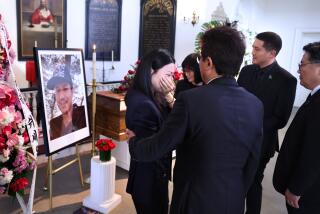Telling Crime From Illness
- Share via
The places where cops and the mentally ill meet are often danger zones. For different reasons, neither may know exactly what the other is up to. That uncertainty can produce disastrous consequences.
They can meet, unexpectedly, anywhere. On the street. In a barricaded room. Or, as was the case 10 days ago, in Grandma’s backyard in Tustin.
In a way, Nancy Speer’s 16-year-old son, Ben, got lucky that day. He showed a gun in the presence of officers and came out alive. Arrested and looking at several felony charges, and a hearing to determine whether he should be charged as a juvenile or an adult, he’s in Orange County Juvenile Hall.
Nancy Speer is pleading for a third option. “He needs to be in a mental hospital,” she says of her son, who has Asperger’s syndrome. “He seems confused and frightened in a jail setting. He’s been begging me to get him into a hospital.”
Asperger’s is the same ailment that plagued William Freund, the 19-year-old Aliso Viejo man who killed two neighbors and then himself late last month. An expert told The Times after that incident that violence is not common with Asperger’s.
While insistent that incarceration is wrong for her son, Speer is not sugar-coating what happened that Sunday afternoon. In fact, her account is nearly identical to that given by police:
Speer, Ben and his friend visited her mother in Tustin to discuss a loan that Ben wanted from his grandmother to buy a computer. Ben became convinced that his uncle, who lives with Ben’s grandmother but was not home that day, had stolen his grandmother’s checkbook. As a manifestation of his confusion, Speer says, her son called police to report the “theft.”
Speer feared her son was lapsing into what she calls a mood in which he “breaks with reality.” Her fears were warranted; Ben eventually smashed the windows and broke into his uncle’s private quarters. Speer, her mother and Ben’s friend locked themselves in a room.
Meanwhile, Ben, who is 6 feet 1 and 230 pounds, began shooting up his uncle’s room with a gun he found inside it. Speer called 911.
Ten to 15 officers eventually responded, police Lt. Jim Peery says. One of them ordered Ben to drop his gun, but “he turned and was going to shoot at one of the officers.” The officer fired a single shot from about 15 yards away that missed Ben. The boy then put down his gun, Peery says.
Peery says he’s convinced from police reports that Ben would have killed his uncle and harmed anyone else in the yard.
These are wrenching cases that involve public safety and helping the sick.
“I’m terrified on behalf of my son,” Speer says. “He has the emotional capacity of maybe a 7-year-old. He’s bright cognitively ... but the Asperger’s has inhibited him developmentally.” A typical person’s bad feeling becomes a “very, very bad feeling” for him, she says.
In a problem facing many parents of mentally ill children, medications are meted out on a trial-and-error basis. Ben had been taking Geodon -- as William Freund apparently had -- for about two months. Since the incident, Speer says, she and his psychiatrist discontinued Geodon and put Ben back on his previous medication, with increased dosage. “He’s his old self,” Speer says.
He was bullied as a youngster, as is common for those with Asperger’s, but his mother says that didn’t crush his spirit. She cites as an example that the Autism Society of America paid his way last spring to Sacramento, where he addressed legislators.
For now, Ben appears destined to be but the latest participant in a complicated social enterprise: whether we distinguish criminality from illness.
“I want him helped, however they can help him,” Speer says. “If it helps him to go to a youth camp or mental hospital, I want him helped. He’s a good soul and has all the potential in the world of being a good adult. He just needs help.”
*
Dana Parsons’ column appears Wednesdays, Fridays and Sundays. He can be reached at (714) 966-7821 or at dana.parsons@latimes.com. An archive of his recent columns is at www.latimes.com/parsons.
More to Read
Sign up for Essential California
The most important California stories and recommendations in your inbox every morning.
You may occasionally receive promotional content from the Los Angeles Times.













